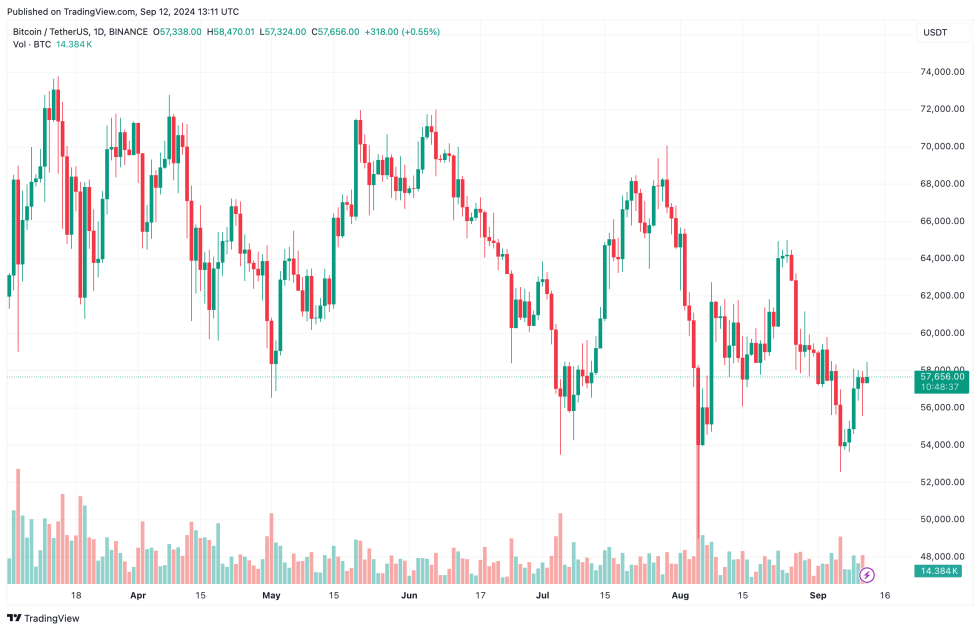Spot Bitcoin ETFs Face $43 Million In Outflows After Two Days Of Inflows
US-based spot Bitcoin (BTC) exchange-traded-funds (ETFs) saw a net outflow of $43 million on September 11, 2024, following two days of inflows, data from SoSoValue confirms.
Ark Invest and Grayscale Lead Bitcoin ETF Outflows
According to data from SoSoValue – a crypto ETF data provider – US spot BTC ETF outflows were led by Ark Invest and 21Shares’ ARKB, which witnessed a net outflow of $54 million yesterday. This was followed by Grayscale’s GBTC spot Bitcoin ETF, which experienced a net outflow of $4.6 million. Notably, another Grayscale product called the Bitcoin Mini Trust saw a net outflow of $511,000.
Conversely, the net inflows for the day were spearheaded by Fidelity’s FBTC, which attracted close to $12.6 million. This was followed by Invesco’s BTCO which observed $2.59 million in net inflows.
Ethereum (ETH) ETFs had a similar day as they witnessed $542,000 in net outflows. Although Fidelity’s FETH attracted $1.17 million in net inflows, it was annulled by $1.71 million in net outflows seen in VanEck’s ETHV product.
Cumulatively, the 12 spot Bitcoin ETFs tracked by SoSoValue have amassed $17 billion in net inflows since their inception in January 2024. By contrast, the 9 spot Ethereum ETFs’ cumulative net outflow is approximately $563 million.
Among other factors, the stark difference between the performance of Bitcoin and Ethereum ETFs could be attributed to the fact that Ethereum ETFs didn’t have the kind of anticipation within the crypto industry or high level of interest from institutional investors that Bitcoin ETFs likely benefitted from during their launch.
What Could ETF Outflow Suggest About Investor Confidence?
Outflows from Bitcoin and Ethereum ETFs could indicate that the investors are practicing caution ahead of the sensitive macroeconomic events that could induce volatility in the crypto markets, such as the US Federal Reserve’s (Fed) decision to cut interest rates next week or the US Presidential Elections scheduled in November 2024.
Given that the aforementioned net outflows occurred after two days of net inflows, it could be worth considering whether yesterday’s higher-than-anticipated US core CPI reading had any impact on investors’ decision to pull some funds out of their digital asset ETFs.
It’s also possible that the more savvy investors could just be pulling their funds out anticipating better entry points to reinvest in these assets, meaning a temporary upcoming pull-back in BTC and ETH prices could be on the horizon. As a result, the net outflows might be a sign of strategic profit-taking by investors instead of a loss of confidence in the underlying asset class.
Recent developments indicate that institutional appetite for digital assets is not slowing down. BlackRock – the world’s largest asset manager – eclipsed Grayscale to cement itself as the company with the highest crypto ETF holdings.
Further, a report by cryptocurrency exchange Gemini noted that Bitcoin and Ethereum ETFs have generated inflows worth billions of dollars from institutional investors. However, regulatory gray clouds surrounding crypto remain a cause of concern.
At press time, Bitcoin is trading at $57,656, up 1.3% in the past 24 hours with a total market cap of $1.14 trillion. Ethereum trades at $2,343, up a modest 0.2% in the last 24 hours with a total market cap of $281.7 billion. The total crypto market cap stands at $2.12 trillion, witnessing a rise of 0.3% in the last 24 hours, according to data from CoinGecko.
